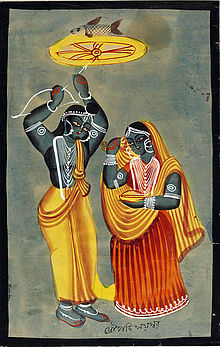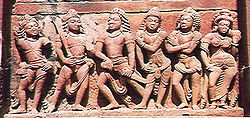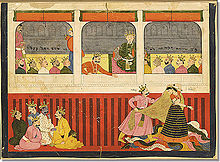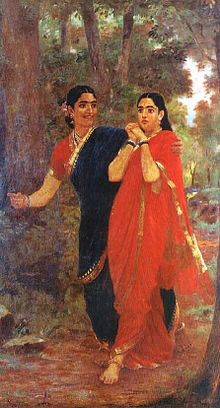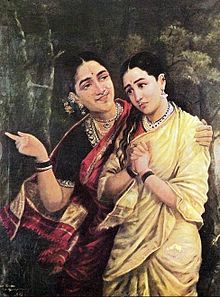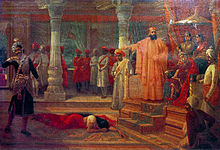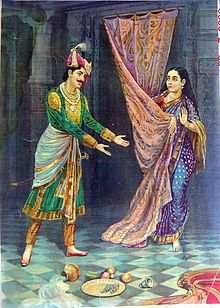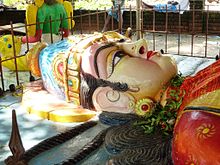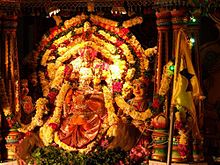- Draupadi
-
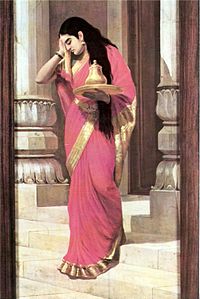 Draupadi. Painting by Raja Ravi Varma.
Draupadi. Painting by Raja Ravi Varma.
In the epic Mahābhārata, Draupadi, also known as Kṛṣṇā draupadī (Devanagari: कृष्णा द्रौपदी; approximate pronunciation: [krɪʂɳaː d̪rəʊpəd̪iː]) is the "emerged" daughter of King Drupada of Panchāla and the wife of the five Pandavas. When Yudhisthira becomes the king of Hastinapura at the end of the war, Draupadi (again) becomes the queen of Indraprastha. She is also variously referred as Kṛṣṇā (or Krishnaa, meaning one of darker complexion), Panchali (meaning one from the kingdom of Panchāla), Yajnaseni (meaning one born from a Yajna or fire-sacrifice), Mahabhaartii (great wife of the five descendents of Bharata) [1] and Sairandhri (literally: an expert maid, her assumed name during her second exile in which she worked as Virat kingdom's queen Sudeshna's hair-stylist). She had five sons, one by each of the Pandavas: Prativindhya, Sutasoma, Shruthakeerti, Satanika, and Srutasena. She has been described in the Mahabharata to be extraordinarily beautiful- undefeated by any woman of her time in terms of beauty. She is one of the Panch-Kanya (The Five Virgins) of Ancient Hindu Mythology along with her mother in law Kunti.
Birth
King Drupada of Panchala had been defeated by the Pandava prince Arjuna on behalf of Drona, who subsequently took half his kingdom to humiliate him. To gain revenge on Drona, he performed a fire-sacrifice (yajña) to obtain a means of besting him. Draupadi emerged as a beautiful dark-skinned young woman together with her siblings Dhṛṣṭadyumna and Śikhaṇḍī from the sacrificial fire. She was named Kṛṣṇā for her dark complexion, though she is better known as Draupadī "daughter of Drupada".
Draupadi's Description
"Of eyes like lotus-petals and of faultless features endued with youth and intelligence, she is extremely beautiful. And the slender-waisted Draupadi of every feature perfectly faultless, and whose body emitteth a fragrance like unto that of the blue lotus for two full miles around."
".. the five (Pandavas)--attracted towards Draupadi like mighty elephants towards a lake overgrown with lotuses, or like fire covered with ashes, Krishna the foremost of Yadu heroes began to reflect. And he said unto Rama (Valadeva), 'That is Yudhishthira; that is Bhima with Jishnu (Arjuna); and those are the twin heroes.' And Rama surveying them slowly cast a glance of satisfaction at Krishna(Draupadi)."
"And the sons of Pritha(Kunti) also, of mighty arms, and the illustrious twin heroes, beholding Draupadi, were all likewise struck by the shafts of Kama."
"..the Pandavas all cast their eyes upon the princess of Panchala. And the princess of Panchala also looked at them all. And casting their glances on the illustrious Krishna, those princes looked at one another. And taking their seats, they began to think of Draupadi alone. Indeed, after those princes of immeasurable energy had looked at Draupadi, the God of Desire invaded their hearts and continued to crush all their senses. As the lavishing beauty of Panchali who had been modelled by the Creator himself, was superior to that of all other women on earth, it could captivate the heart of every creature. And Yudhishthira, the son of Kunti, beholding his younger brothers, understood what was passing in their minds. And that bull among men immediately recollected the words of Krishna-Dwaipayana. And the king, then, from fear of a division amongst the brothers, addressing all of them, said, 'The auspicious Draupadi shall be the common wife of us all.' "
"Yudhishthira said, 'With Draupadi as stake, who is neither short nor tall, neither spare nor corpulent, and who is possessed of blue curly locks, I will now play with thee. Possessed of eyes like the leaves of the autumn lotus, and fragrant also as the autumn lotus, equal in beauty unto her (Lakshmi) who delighteth in autumn lotuses, and unto Sree herself in symmetry and every grace she is such a woman as a man may desire for wife in respect of softness of heart, and wealth of beauty and of virtues. Possessed of every accomplishment and compassionate and sweet-speeched, she is such a woman as a man may desire for wife in respect of her fitness for the acquisition of virtue and pleasure and wealth. Retiring to bed last and waking up first, she looketh after all down to the cowherds and the shepherds. Her face too, when covered with sweat, looketh as the lotus or the jasmine. Of slender waist like that of the wasp, of long flowing locks, of red lips, and body without down, is the princess of Panchala. O king, making the slender-waisted Draupadi, who is even such as my stake, I will play with thee, O son of Suvala.'"
Marriage to the Pandavas
Drupada intended that Arjuna alone win the hand of his daughter. Upon hearing of the Pandavas' supposed death at Varanavata he set up a swayamvara for Draupadi intending to bring Arjuna out into the open. The princes vying for Draupadi's hand had to shoot five arrows at a revolving target, while looking only at its reflection in a bowl. Drupada was confident that Arjuna alone could accomplish this task. Arriving with his brothers disguised as Brahmins (priests), Arjuna successfully tackled the target, which other kings and prince were unable to accomplish.
While in exile, Kunti, mother of the Pandavas often advised her sons that they share everything they have (or obtain through Bhiksha i.e. alms) equally amongst themselves. Upon returning home with Draupadi, on purpose, Arjuna addresses his mother first "Look mother, I have brought Bhiksha (alms)!". Kunti, unmindful of what Arjuna was referring to, unassumingly asked her son to share whatever it is with his brothers. Thus, in order to obey their mother's order all five accepted Draupadi as their wife.
When Krishna visits the family, he explains to Draupadi that her unique position as the wife of five brothers results from a certain incident in her previous birth, She was born as Nalayani (daughter of Nala and Dhamayanthi) She had in that lifetime prayed to Shiva to grant her a husband with five desired qualities. Shiva, pleased with her devotion, tells her that it is very difficult to get a husband with all five qualities that she desired. But she sticks to her ground and asks for the same. Then Lord Shiva grants her wish saying that she would get the same in her next birth with five husbands, she was shocked and asked lord shiva is it a boon or curse, shiva replied back saying "My child do not get worried, you will regain your virginity each an every morning you take bath, till the end of your life you will live with virginity" Hence she gets married to five brothers each who represents a given quality: The just Yudhisthira for his wisdom of Dharma; The powerful Bhima for his strength that exceeded that of a thousand elephants combined; The valiant Arjuna for his courage and knowledge of the battlefield; the exceedingly handsome Nakula and Sahadeva, for their love that put even Kama, the God of Love, to shame. Over here Pandava's represents to Five Virtue's not as human beings
None of Draupadi's children survive the end of the epic. Parikshita, grandson of Subhadra and Arjuna, is the sole Pandava descendent who survives, at the end of Mahābhārata.
Karna at swayamvara
Karna was a suitor for Draupadi at her swayamvara. Unlike most other contenders, he was easily able to wield and string the bow, but as he was ready to set aim, on Krishna's gesture, Drupada restrained him from shooting the arrow by calling him a soota-putra (son of a charioteer). The Pandavas were also present in the swayamvara, disguised as brahmanas. Following the failure of the other princes, Arjuna stepped into the ring and successfully hit the target, winning Draupadi's hand. This insult by Drupada thus was one of the reasons of her downfall in the court room after the 'dice game'course. Karna insulted Draupadi by saying that Pandavas were all like sesame seeds removed from the kernel and she should now find some other worthy husbands. Draupadi was very faithful and loved the Pandavas from the deep of her heart though she had special love for Arjuna who had won her hand.
Duryodhana's insult
Indraprastha was built at the site of the Khandava forest. The pride of buildings was the Palace of Illusions and this was where Draupadi took Duryodhana and his entourage. The moment Duryodhana entered the palace he encountered an atmosphere of mystery. A retinue of maidservants appeared through a wall and lined up before the guests. The courtyard was divided in two parts. The surface of one part appeared to ripple like the surface of a lake. The surface of the other part appeared solid as granite flooring and when Duryodhana stepped on the apparently solid part of the courtyard, there was a splash and Duryodhana found himself waist deep in water, drenched from head to foot. When Draupadi's maids saw this from the balcony they were amused. Duryodhana felt extremely insulted that Draupadi and her maids saw his embarrassing predicament. Draupadi's statement of "andhey ka putra andha" meaning "blind man's (referring to Dhritrashtra) son is blind" further enraged Duryodhana.This was the last straw, he swore revenge on her and such a revenge that Pandavas would fall at his feet begging for mercy.
The Game of Dice
This key incident is often considered to mark a definitive moment in the story of Mahābhārata. It is one of the driving reasons that ultimately led to the Mahābhārata war, though it cannot be considered the central or the most important one.
Yudhishthira and his four brothers were the rulers of Indraprastha under the sovereignty of King Dhritarashtra. Dhritarashtra’s son Duryodhana who resided in the capital of the empire Hastinapura was always jealous of his cousins and the wealth they had acquired by building Indraprastha. To take revenge on the Pandavas, his uncle Shakuni came up with a plan and together with his brothers, his friend Karna and maternal uncle Shakuni, he conspired to call the Pandavas at Hastinapura and win their kingdoms in a game of gambling. Shakuni was skilled at winning by unfair means. The idea was that Shakuni would play against Yudhishthira and win at the gambling table what was impossible to win at the battlefield.
As the game proceeded, Yudhishthira lost all his wealth and kingdom one by one. Having lost all material wealth, he went on to put his brothers at stake one by one and lost them too. Ultimately he put himself at stake, and lost again. All the Pandavas were now the servants of Kauravas. But for the Shakuni, the humiliation of Pandavas was not complete. He prods Yudhishthira that he has not lost everything yet; Yudhishthira still has Draupadi with him and if he wishes he can win everything back by putting Draupadi at stake. Yudhishthira walks into the trap and to the horror of everybody present, puts Draupadi as a bet for the next round. But Bhishma and [[Drona oppose this move recalling that a woman cannot be put at stake even if it is their own wife. However, Yudhishthira ignores their call and puts her at stake much to the ire of Bhishma, who in his frustration breaks his chair. Playing the next round, Shakuni wins. Duryodhana commands his younger brother Dushasana to bring her into the forum, if not forcefully. Dushasana barges into the living quarters of Draupadi, who was "clad in one piece of attire" as referring to the sari.[2] Dushasana grabs her by the hair and brings her into the court dragging her by the hair.
Bhima and Draupadi, as depicted in yakshagana.
Now in an emotional appeal to the elders present in the forum, Draupadi repeatedly questions the legality of the right of Yudhishthira to place her at stake when he himself had lost his freedom and as a consequence did not possess any property in the first place. Everybody remains dumbfounded. Bhishma, the patriarch of the Kaurava family and a formidable warrior, has only this explanation to offer to Draupadi - “The course of morality is subtle and even the illustrious wise in this world fail to always understand it.” Duryodhana now commands the Pandavas to strip themselves in the manner of dasa. They obey by stripping off their upper garments. Then to the horror of everybody present, Duryodhana orders Dushasana to disrobe Draupadi and he tries to disrobe Draupadi of her sari. Seeing her husbands unable to help her, Draupadi prays to Lord Krishna to protect her. A miracle occurs henceforward, which is popularly attributed to Krishna but in Vyasa's Mahabharata, Draupadi's saviour is named as Dharma (who could be just morality, the god Dharma, Krishna as the Lord of Dharma, or even Vidura or Yudhishthira, or even a logical paradox of Draupadi's question - did Yudhishthira have the right to stake her when he had already lost himself). As Dushasana unwraps layers and layers of her sari, her sari keeps getting extended. Bhima is furious at Dushasana and says, "I Bhim, Pandu's son vows until I will tear open Dushasana's chest and drink his blood I will not show my face to my ancestors." Finally, a tired Dushasana backs off without being able to strip Draupadi. Duryodhana repeatedly challenges Yudhishthira’s four brothers to disassociate themselves from Yudhishthira’s authority and take their wife back. No one dares to denounce their loyalty to their eldest brother. In order to provoke the Pandavas further, Duryodhana bares and pats his thigh looking into Draupadi’s eyes, implying that she should sit on his thigh. In rage Bhima vows in front of the entire assembly that "one day he will break that very thigh of Duryodhan in battle".
The only Kaurav who objects to the disrobing of Draupadi in the court is Vikarna. Vikarna also appeals the assembly to answer the questions raised by Daruapadi but in vain.
Finally, the blind monarch Dhritarashtra's conscience is stirred, in part fearing the wrath of Pandavas against his sons. He intervenes and asks Draupadi to wish for whatever she desires. Draupadi asks her husbands the Pandavas to be freed from bondage. Dhritarashtra grants her wish and also restores to Pandavas all they lost in the game of dice. Free from the bondage Bhima immediately proposes to his brothers to slay all Kauravas present then and there itself. Yudhishthira, however, restraints him from taking any action.
Shakuni and Duryodhana later convince Dhritarashtra to invite Pandavas for a new game of dice, with modified rules, that the loser would go for 12 years exile and another one year anonymity. Yudhisthira asks Dhritrashtra what his order would be, as Dhritrashtra being the king and elder to their own father, where Dhrithrashtra could not reply anything. Thus, Yudhisthira understanding his intention decides to play another game. It was following the defeat in this new game that Pandavas were sent into exile for 13 years.
Abduction of Draupadi by Jayadratha
While the Pandavas were in the Kamyaka forest, they often went hunting, leaving Draupadi in the care of Dhaumya, their priest. At this time Jayadratha, the son of Vriddhakshatra, the husband of Duryodhana’s sister Dussala, passed through Kamyaka forest on the way to Salwa Desa. There he saw Draupadi. Jayadratha then started beseeching her to go away with him and desert her husbands who had fallen upon bad times. Draupadi pointed out that it was wrong to desert one’s spouses when they were in difficulty and then gave him a rather long and deliberately delaying speech on exactly the sort of bad time her husbands would give him on their return.Jayadratha then said “thou canst not frighten us(he was with several other Kings when he saw and abducted Draupadi) now with these threats. We, too, O Krishna, belong by birth to the seventeen high clans, and are endowed with the six royal qualities.” and was sure that he could beat the Pandavas in battle. Draupadi said “Even Indra himself cannot abduct her for whose protection Krishna and Arjuna would together follow, riding in the same chariot.” And she spoke of the way in which Jishnu (Arjuna) would rout Jayadratha and his armies. She also said, “The warring princes of the Andhaka and the Vrishni races, with Janardana at their head, and the mighty bowmen of the Kaikeya tribe, will all follow in my wake with great ardour”. Failing with words Jayadratha tried violence and she called for Dhaumya’s help. Though she pushed him to the ground, he overpowered her and forced her onto his chariot. Meanwhile the Pandavas had finished their hunt and Yudhisthira observed that all the animals were disturbed in one direction and was suddenly overcome by premonitions. So he and his brother climbed their chariots pulled by horses of Saindhava breed and gave chase in the direction of the disturbance.And on learning of their wife's abduction by Jayadratha they rushed towards that host with great fury( like hawks swooping down on their prey. And possessed of the prowess of Indra, they had been filled with fury at the insult offered to Draupadi. But at sight of Jayadratha and of their beloved wife seated on his car, their fury knew no bounds).Then follows the exciting description of a battle in which the five pandavas routed the Sauviras, Ikshwakus, Sivis, and Saindhavas and their armies. Jayadratha in fear ran away, leaving Draupadi behind in all this confusion. Dharmaja urged Bhima to spare Jayadratha’s life for the sake of Dussala and Gandhari, much to the indignation of Draupadi.And that highly intelligent lady said to her two husbands, Bhima and Arjuna with indignation mixed with modesty, 'If you care to do what is agreeable to me, you must slay the chief of the Saindhava clan! That foe who forcibly carries away a wife, and he that wrests a kingdom, should never be forgiven on the battle-field, even though he should supplicate for mercy!'.Thus admonished, it was decided to make him humiliated. Then the two valiant warriors went in search of the Saindhava chief. Bhima and Arjuna caught up with Jayadratha and Arjuna asked him how an unmanly fellow like himself had the guts to take a woman away by force. Thereafter there was more running away than actual fighting and Bhima caught Jayadratha and wanted to kill him. Arjuna reminded him of Dharmaraj(Yudhisthira)’s words, so they brought Jayadratha to their hermitage.After bringing the chained Jayadratha back to the hermitage where he was to declare to be slave of Pandavas and was hence, shaved on his head at five places and then freed.(Book 3: Vana Parva-Draupadi-harana Parva)
Kichaka's death
While the Pandavas were leading their normal life in their own disguised form, one day Kichaka, the brother of Sudeshana, and the commander of king Virata’s forces, happened to see the Draupadi. He was filled with lust by looking at her. He asked her to marry him, but Draupadi refuses him saying that she is already married to ‘Gandharvas’, so as not to reveal their true identity as they were in exile. She warns Kichaka that her husbands are very strong and he would not be able to escape death at their hands. Later he forces his sister, queen Sudeshna to help him win Draupadi. Sudeshna orders Draupadi to fetch wine from Kichak's house. Draupadi tries to dissuade the queen from sending her to kichaka's house but fails. When Draupadi goes to get wine, Kichaka tries to molest her. Draupadi escapes and runs into the court of Virata. Kichaka kicks her in front of all the courtiers including Yudhisthira who was also present in the court at that time. The king being weak in front of Kichaka does not take any action. Draupadi asks about the duties of a king and dharma. Draupadi then curses Kichaka in the court that her husbands ‘Gandharvas’ will surely kill him. However, Kichaka only doubts their whereabouts and asks those present in the court that where are they then. Yudhisthra then in disguise of being the king's adviser replies, that they Gandharvas would not come as they want her to forgive Kichaka for the time being. With this the king asks Kichaka to leave for the honour of the court and praises Yudhistira's reply as he himself could not think of anything. Later that night, Pandavas together hatch a plan to kill Kichaka. Khichaka meets her later again and tells her that he is the strongest in that country and she has no way other than to accept him. Draupadi, as per the plan, agrees with him but on condition that none of his friends or brothers should know about their relationship. Kichaka accepts her condition and promises her that he will not let anyone know. Draupadi asks Kichaka to come to the dancing hall at night. Bhima(in the guise of Draupadi) that night in the dancing hall, fights with Kichaka and kills him. (Book 4: Virata Parva, Kichaka-badha Parva)
Devotion to Krishna
Perhaps Draupadi’s most exceptional quality was that Shri Krishna considered her his sakhi (friend) and sister. One day when Krishna cut his finger, Draupadi immediately tore off a piece of her sari and bandaged his cut. Krishna said that with this loving act, she wrapped him in debt and he would repay each “thread” when the time comes. Indeed, when Draupadi needed Krishna’s protection and fervently prayed for his help, he came to the rescue and gave her unlimited cloth. This is one of the stories of the origin of the Raksha Bandhan festival.
Once, while the Pandavas were in exile, Durvasa Muni, who was known for his quick anger, suddenly decided to drop in along with his many thousands of disciples. He would naturally want something to eat for himself and his followers, but the Pandavas had just eaten and there was no more food left. Fearful of Durvasa’s anger, Draupadi prayed to Krishna. When he appeared, Draupadi took the last grain of rice in the pot and asked Krishna to eat half for himself and half for the whole world. When Durvasa and his disciples arrived, they were all so full that they did not want anything to eat, and thus left peacefully.
Draupadi is an exemplification of bhakti, and she experienced God’s divine presence constantly in her life. When she questioned Krishna about everything that had happened to her, he reassured her: “Soon wilt thou, O Krishna, behold the ladies of Bharata's race weep as thou dost. Even they, O timid one, will weep like thee, their kinsmen and friends being slain. They with whom, O lady, thou art angry, have their kinsmen and warriors already slain. With Bhima and Arjuna and the twins, at Yudhishthira's command, and agreeably to fate, and what hath been ordained by the Ordainer, I will accomplish all this. Their hour having arrived, the sons of Dhritarashtra, if they do not listen to my words, will surely lie down on the earth turned as morsels of dogs and jackals. The mountains of Himavat might shift their site, the Earth herself might spilt into a hundred fragments, the firmament itself with its myriads of stars might fall down, still my words can never be futile. Stop thy tears, I swear to thee, O Krishna, soon wilt thou see thy husbands, with their enemies slain, and with prosperity crowning them."
Her Existence And Personality
As per The Garuda Purana Draupadi is the incarnation of Bharati-Devi, The Consort of Lord Vayu. As per Narada and Vayu Puranas, Draupadi is the composite Avatar of Goddesses Shyamala (wife of Dharma), Bharati (Wife of Vayu), Shachi (wife of Indra), Usha (wife of Ashwins), and Parvati (wife of Shiva), and hence married their earthly counterparts in the form of the five Pandavas. Enraged at a jest by Parvati, Shyamala, Shachi and Usha, Brahma cursed them to human birth. Parvati thought of the solution wherein they will be born as one woman, Draupadi and hence share the earthly body for a smaller period of time. They requested Bharati to be with them in their human birth. Draupadi's characteristic fight against injustice reflects Parvati or her Shakti, Kali, inhabiting Draupadi's mortal flesh at times. At other times, Draupadi was docile and even waited to be rescued (as in case of Jayadratha and Jatasura) showing the qualities of other goddesses like Shachi and Usha. Other times, she showed astuteness in hiding their true identity and asking Vayu's son Bhima to kill the evil Keechaka, like Goddess Bharati would. Draupadi was also avatar of Goddess Shree, who was joint wife to five Indras, who incarnated as the Five Pandavas.
She was to be born several times for imprisoning the Indras. The first time was as Vedavati who cursed Ravana (who is another goddess Avatar Swaha, wife to Agni). She then came in place of Sita's avatar, to be the cause of Ravana's death, while Agni hid the real Sita. Her third incarnation was partial: either Damayanti (whose husband, Nala, was equivalent to Dharma, Vayu, and Indra, just like the Pandavas) or her daughter Nalayani. She married Sage Mudgala. The fifth avatar was Draupadi herself. So, we find in Draupadi, a composite avatar of Kali, Parvati, Shachi, Shyamamala, Usha, Bharati, Shree, and Swaha, the eight goddesses.
Draupadi was a multifaceted personality: she could be fiery and angry when the situation called for it, but she still had a compassionate nature. She knew all the servants in the palace by name and they affectionately called her “bahu rani.” She encouraged people to face life with the same inner strength that she did. For example, after Abhimanyu’s death, she consoled his grieving widow, Uttara, by reminding her of the cause for which Abhimanyu gave his life. She encouraged Uttara to gather her strength for the sake of her and Abhimanyu’s child, whom she was carrying at the time. After the war, Draupadi looked after Gandhari with respect and affection, even though Gandhari’s sons had wronged her in so many ways.
Because of her virtuous nature, Draupadi is considered one of the panchakanya, a group of five women who are especially venerated in the Hindu tradition. The other four are: Kunti, the mother of the Pandavas and an accomplished scholar of the Atharva Veda; Tara, the wife of Vali who was instrumental in reconciling Rama with Sugreev; Ahalya, Sage Gautam’s wife who was given a blessing of purity from Shri Ram; and Mandodari, the virtuous wife of Ravana who had the courage to speak out against her husband when he abducted Sita. Simply remembering these virtuous women destroys great sins.
Draupadi's Description of the Pandavas
Her description of Pandavas to Jayadratha when he abducts her, "With a complexion like that of pure gold, possessed of a prominent nose and large eyes, and endued with a slender make, that husband of mine is known among people by the name of Yudhishthira, the son of Dharma and the foremost of the Kuru race. That virtuous prince of men granteth life to even a foe that yields. Therefore, O fool, throwing down thy arms and joining thy hands, run to him for thy good, to seek his protection. And that other man whom thou seest with long arms and tall as the full-grown Sala tree, seated on his chariot, biting his lips, and contracting his forehead so as to bring the two eye-brows together, is he,--my husband Vrikodara! Steeds of the noblest breed, plump and strong, well-trained and endued with great might, draw the cars of that warrior! His achievements are superhuman. He is known, therefore, by the name of Bhima on earth. They that offend him are never suffered to live. He never forgetteth a foe. On some pretext or other he wrecketh his vengeance. Nor is he pacified even after he has wrecked a signal vengeance. And there, that foremost of bowmen, endued with intelligence and renown, with senses under complete control and reverence for the old—that brother and disciple of Yudhishthira—is my husband Dhananjaya! Virtue he never forsaketh, from lust or fear or anger! Nor doth he ever commit a deed that is cruel. Endued with the energy of fire and capable of withstanding every foe, that grinder of enemies is the son of Kunti. And that other youth, versed in every question of morality and profit, who ever dispelleth the fears of the affrighted, who is endued with high wisdom, who is considered as the handsomest person in the whole world and who is protected by all the sons of Pandu, being regarded by them as dearer to them than their own lives for his unflinching devotion to them, is my husband Nakula possessed of great prowess. Endued with high wisdom and having Sahadeva for his second, possessed of exceeding lightness of hand, he fighteth with the sword, making dexterous passes therewith. Thou, foolish man, shall witness today his performances on the field of battle, like unto those of Indra amid the ranks of Daityas! And that hero skilled in weapons and possessed of intelligence and wisdom, and intent on doing what is agreeable to the son of Dharma, that favourite and youngest born of the Pandavas, is my husband Sahadeva! Heroic, intelligent, wise and ever wrathful there is not another man equal unto him in intelligence or in eloquence amid assemblies of the wise. Dearer to Kunti than her own soul, he is always mindful of the duties of Kshatriyas, and would much sooner rush into fire or sacrifice his own life than say anything that is opposed to religion and morals." (Book 3: Vana Parva, Section 268)
Polyandry
The marriage of Draupadi with five Pandava men, i.e., polyandry, was not regarded without censure by the society spoken of in the epic. The Indo-Aryan texts almost never mention or allow polyandry, although polygamy was common among men of higher social ranks. Her marriage to five men was controversial. However, when questioned by Kunti to give an example of polyandry, Yudhisthira cites Gautam-clan Jatila (married to seven Saptarishis) and Hiranyaksha's sister Pracheti (married to ten brothers).[3]
Draupadī's polyandrous marriage seems to have been a historic event; otherwise the author of the Mahābhārata, who is at his wit's end to justify it, would have quietly kept silence about it. ... The Mahābhārata proceeds to give several fantastic reasons in justification of Draupadī's marriage; only one of them may be given by way of illustration. Draupadī got five husbands in this life because in one of her previous existences she had five times uttered the prayer to God, 'Give me a husband' (Mbh 1:213). [See also Mbh 1:206:2,27; 1:210:29 for contemporary cultural responses to polyandry.][4]
Owing to her marriage to five husbands, Draupadi had to live with each one of them turn-by-turn for one year each. She had the boon to be born virgin every year, and is therefore called an eternal Kanya (a virgin).[5] In the Svargarohana Parva of Mahabharat, during their final journey to heaven, Draupadi and all Pandavas but Yudhisthira fall on their way. The reason for the fall of Draupadi is quoted as she being more doting towards Arjuna than the rest of the brothers. Draupadi always loved Arjuna more because Arjuna was the one who won the swayamvara and was also the close friend of Krishna.
Her End
When her husbands retired from the world and went on their journey towards the Himalayas and Indra's heaven, she accompanied them, and was the first to fall on the journey. When Bhim asked Yudhisthir, "This princess never did any sinful act. Then why is she fallen on Earth?" Yudhisthir replied, "Though we were all equal unto her, she had great partiality for Dhananjay(Arjun). She obtains the fruit of that conduct today."
"Beholding his brothers fallen on the Earth, king Yudhishthira the just said unto that deity of a 1,000 eyes these words: ‘My brothers have all dropped down here. They must go with me. Without them by me I do not wish to go to Heaven, O lord of all the deities. The delicate princess (Draupadi) deserving of every comfort, O Purandara, should go with us. It behoveth thee to permit this."
"He also beheld the princess of Panchala, decked in garlands of lotuses. Having attained to Heaven, she was sitting there, endued with a form possessed of solar splendour. King Yudhishthira suddenly wished to question her. Then the illustrious Indra, the chief of the gods, spoke to him, ‘This one is Sree herself. It was for your sake that she took birth, as the daughter of Drupada, among human beings, issuing not from any mother’s womb, O Yudhishthira, endued with agreeable perfume and capable of delighting the whole world. For your pleasure, she was created by the wielder of the trident. She was born in the race of Drupada and was enjoyed by you all."
Draupati as a village goddess
The Draupati Amman cult (or Draupati cult) is a tradition that binds together a community of people in worshipping Draupati Amman as a village goddess with unique rituals and mythologies. Fire walking or theemithi is a popular ritual enacted at Draupati Amman temples.[6]
Draupadi as Goddess of Fortune
"Arjuna is there, and Draupadi is directly the Goddess of Fortune. There was this injunction that wherever Draupadi will be there, there will be no scarcity of food." [7]
References
- ^ http://pustak.org/bs/home.php?bookid=751
- ^ http://www.sacred-texts.com/hin/m02/m02066.htm
- ^ http://www.sacred-texts.com/hin/m01/m01199.htm
- ^ Anant Sadashiv Altekar, The position of women in Hindu civilization, from prehistoric times to the present day, 2nd revised and illustrated edition, (Motilal Banarsidass, 1959), p. 112–113.
- ^ http://www.boloji.com/hinduism/059f.htm
- ^ Hiltebeitel, Alf (1991). The Cult Of Draupadi Mythologies:From Gingee To Kuruksetra. 1. Motilal Banarsidass. ISBN 9788120810006.
- ^ "Cross This Ocean Of Danger" Srimad-Bhagavatam 1.8.25 Los Angeles, April 17, 1973
- Eminent women in the Mahabharata by Vanamala Bhawalkar.
- Marriage to the Pandavas
- Mahabharata (1999) by Krishna Dharma
- Mahabharata by VedaVyasa
- Shri Krishna tele-serial by late Shri Ramanand Sagar
- Karna Puran
- Mrityunjay a Marathi novel.
- Mahabharata of Krishna Dwaipayana Vyasa, English translation by Kisari Mohan Ganguli
- [1]
Modern Interpretations
In the feminist play WE ARE SO DIFFERENT NOW by Shauna Singh Baldwin (2009), Draupadi, still on earth unable to go to heaven, talks a modern Indian woman out of committing suicide http://www.amazon.com/We-Are-Different-Now-ebook/dp/B003DA42W6/ref=sr_1_8?s=books&ie=UTF8&qid=1311484176&sr=1-8
External links
- http://moralstories.wordpress.com/2006/05/15/draupadi-an-ikon-of-a-true-indian-woman/
- http://www.sacred-texts.com/hin/maha/index.htm
- Draupadi, the Woman: Epitome of Feminity and Feminism by Madhuri Guin
- The Kaurava race of Sri Lanka and the worship of Draupadi
Mahabharata Kuru Kingdom Santanu · Ganga · Bhishma · Satyavati · Chitrāngada · Vichitravirya · Ambika · Ambalika · Vidura · Dhritarashtra · Gandhari · Shakuni · Pandu · Kunti · Madri · Yudhisthira · Bhima · Arjuna · Nakula · Sahadeva · Duryodhana · Dushasana · Yuyutsu · Dushala · Draupadi · Hidimbi · Ghatotkacha · Ahilawati · Subhadra · Uttara · Ulupi · Chitrāngadā · Abhimanyu · Iravan · Babruvahana · Barbarika · Parikshit · JanamejayaOther characters Karna · Drona · Amba · Vyasa · Krishna · Satyaki · Dhristadyumna · Sanjaya · Virata · Kichaka · Kripa · Ashwatthama · Ekalavya · Kritavarma · Jarasandha · Mayasura · Durvasa · Jayadratha · Balarama · Drupada · Hidimba · Shalya · Adhiratha · ShikhandiOther Categories:- Characters in the Mahabharata
- People related to Krishna
Wikimedia Foundation. 2010.

